The Nexus 7 (2013) Review
by Anand Lal Shimpi on August 22, 2013 6:00 PM ESTPlatform Power & Battery Life
The new Nexus 7 moves to a slightly smaller battery compared to its predecessor (15Wh vs. 16Wh). The result however is anything but a reduction in battery life. ASUS and Google worked hard to reduce platform power consumption as much as possible. I instrumented both Nexus 7s and measured total platform power, excluding display, to look at the impact of the silicon platform (SoC, PMIC, DRAM, eMMC, WiFi, etc...). The results are beyond impressive:
Idle power is cut in half compared to last year's model. This is by far the most important improvement as most mobile usage models tend to have long periods of idle time. We'll see these power gains reflected in our web browsing test which does have significant periods of simulated reading time between web page loads. The power reduction while running Kraken grows to just over 20%, and even while running Geekbench 3 we see a 16% drop with the new Nexus 7. Only our offscreen 3D test manages to draw more power on the new Nexus 7 than the old one, and that isn't taking into account the nearly 5x increase in performance on the new Nexus. In fact, as impressive as these numbers are - they are even more impressive when you take into account performance. To make a long story short, don't worry about the ~7% decrease in battery capacity as there are enough improvements in platform power and performance (and thus perf per watt) to more than make up for the smaller battery.
We'll start out with our WiFi web browsing test. Like all of our battery life benchmarks we run this test with all devices calibrated to 200 nits and connected to 5GHz 802.11 WiFi (if supported). The test itself cycles through a bunch of desktop websites at a very aggressive frequency. Our test ensures that both the CPU cores and wireless stack can reach their deep sleep states during simulated reading periods. The test continues until the battery is depleted.
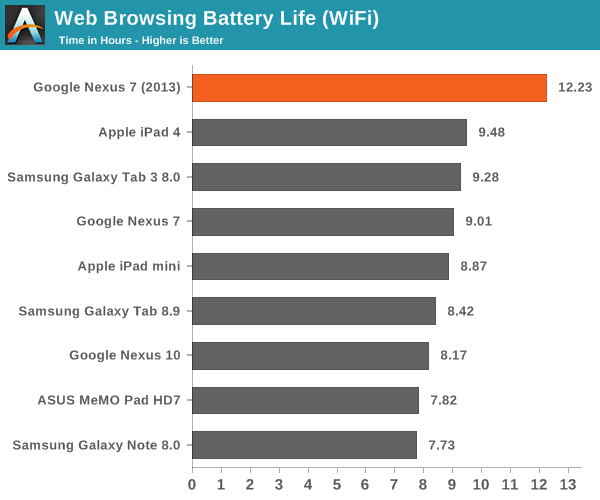
The new Nexus 7 does better here than any other small tablet we've ever tested. Remember that 50% decrease in idle platform power? That's exactly why we're seeing a 35% improvement in battery life compared to the original Nexus 7.
Our video playback test involves looping the playback of a 4Mbps 720p High Profile H.264 transcode of the last Harry Potter Blu-ray. All displays are calibrated to 200 nits.
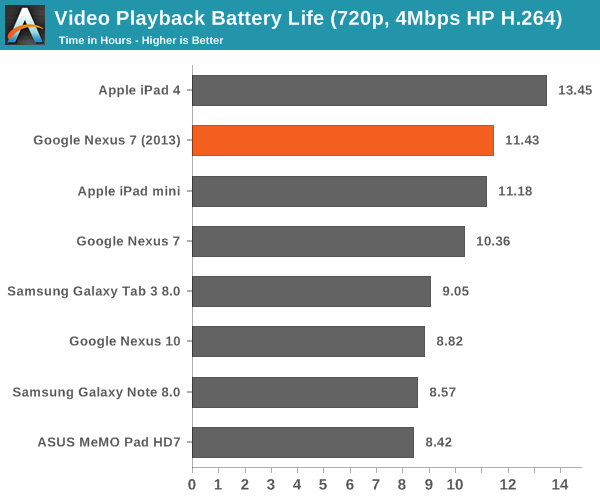
Video decode blocks are fairly well optimized to begin with, so there's not a ton of room for improvement here compared to last year's Nexus 7. Despite the ~7% shrink in battery capacity, the new model manages a 10% increase in battery life though. We also have the first small Android tablet capable of beating the iPad mini in a video playback test here - job well done ASUS/Google.
Our final test involves looping the Egypt HD benchmark until the battery is completely drained. Frame rates are capped to 30 fps to somewhat simulate actual gameplay and not penalize faster GPUs.
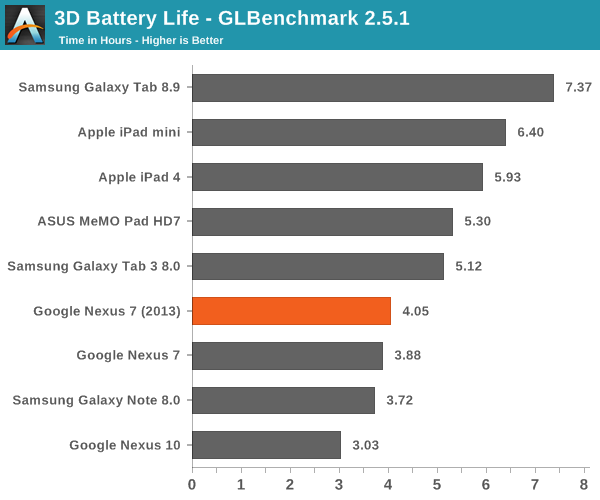
The new Nexus 7 manages to deliver slightly better battery life here despite driving higher frame rates and more pixels. Overall performance here isn't anything super impressive, the only average showing from the Nexus 7.
Google ships the Nexus 7 with an ASUS branded 7W charger, identical to the one you'd find in the box of a MeMO Pad HD7. Given identical chargers and battery capacities, there's no surprise the new Nexus 7 takes the same amount of time to charge as the MeMO Pad HD7 (~3.5 hours).
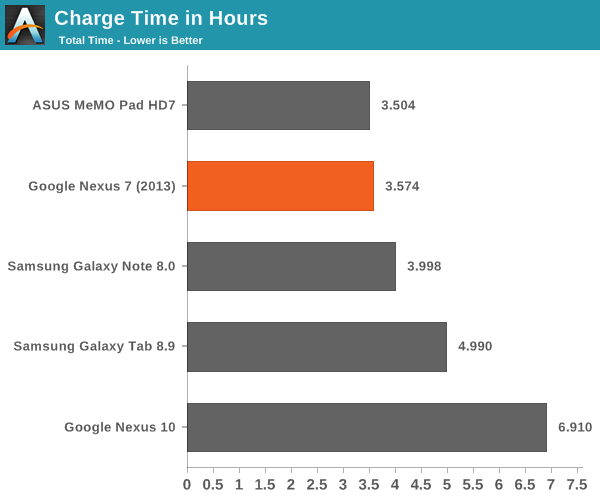
The new Nexus 7 also supports wireless charging by implementing the Qi standard. Charge time is a bit slower wirelessly as Qi can only charge at up to 5W. Brian tested Qi functionality in his mini review of the Nexus 7 and didn't have any issues.


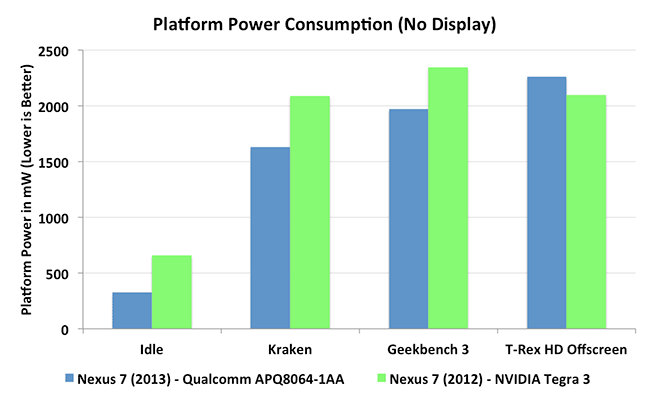
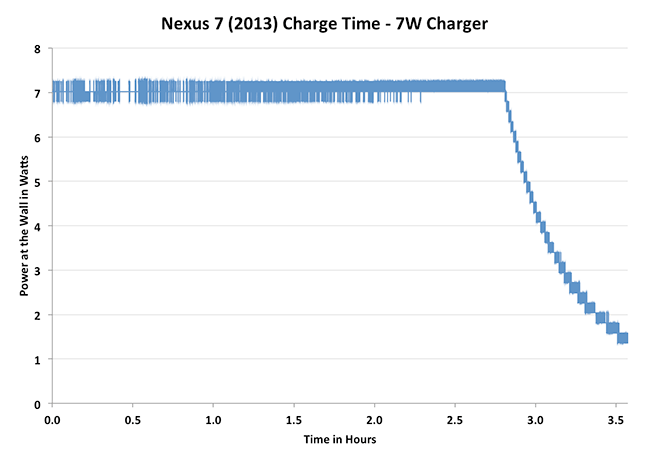








202 Comments
View All Comments
solipsism - Thursday, August 22, 2013 - link
With the Amazon Kindle Fire having the same size display, aspect ratio, running Android (even if it is a more limited version of it), and being at the same $199 price point I wonder why the Kindle Fire isn't compared directly with the Nexus 7.jeffkibuule - Thursday, August 22, 2013 - link
Because it's a more limited version of Android, and software really is everything. Unless you are really into Amazon's ecosystem or just absolutely love hacking software onto hardware, the Kindle Fire isn't a device that should be recommended over the Nexus 7 (2013).hugh2323 - Thursday, August 22, 2013 - link
Have you even used a Kindle Fire? They are so locked into Amazon they are useless as a general purpose tablet. And hacking them is not easy, if possible at all with newer models.BigLan - Thursday, August 22, 2013 - link
I've had the GPS problem on 2 units now - took the first one back which wouldn't last more than 5 minutes without loosing a lock.I've avoided using the google maps/nav app which seems to have worked. I had one gps drop for the first 2 weeks (after copilot crashed) but after update Maps the other day the issues started up again. I uninstalled the update and disabled Maps and it seems to be working again.
I know this is just an anecdote, but maybe it'll work for someone else.
BigLan - Thursday, August 22, 2013 - link
I think that's because Anand is one of the few sites that test at a standard brightness. Most of the other reviews will just use a standard % like 50% which on the new N7 is the same as running the 2012 model at 90% brighness.I haven't seen battery life as long as Anand's numbers though, even using auto brightness which seems like 30-50%, but I do use the gps and play some games which will impact battery life.
It'd be nice to see an idle battery life test as I've seen people complaining about the device losing 10% of the charge daily when unplugged. I know that's be harder (and take much longer) to test, but I've noticed that my adroid devices do drain faster than ios ones do.
teiglin - Thursday, August 22, 2013 - link
You don't need to remind Anandtech readers why brightness-calibrated battery tests are the only reasonable way to test battery life. Percentage tests crack me up every time I see them.I'd also be interested in seeing some sort of idle test, but the things that cause battery to drain while in "standby" are very hard to pin down. Fully power-gated current draw is going to be basically zero for any modern SoC, so that's not really at issue--what causes idle drain is things that wake the device, but usage varies so much that you could argue the issue is not testable--most people probably use push email, so how many emails do you get in a day? Some people may only get half a dozen, while others get hundreds or even more. Do you use Google Now and its location-seeking wakes? Do you let your social networking clients check all the time (some default to ridiculous levels like automatically checking every 15 minutes)?
That doesn't even take into account smaller concerns like signal strength and bluetooth devices--my thoroughly unscientific testing puts the former at around a 1%/hr swing on my phone, while the latter can drain nearly 2%/hr despite being in deep sleep the whole time. I consider "good" idle drain on my phone to be under 1%/hr, though realistically I'm usually a bit higher than that.
That's not to say the issue isn't worth investigating--I'd love to see testing using Brian's base station emulator, and a regular interval for waking with fixed workload at each wake--say, wake every 10 minutes, scan wifi/cellular for location, and receive 1MB of data, or something--but the fact remains that individual circumstances are going to be the absolutely dominant factor in any idle scenario.
As a final note to your iOS comparison, iOS obviously has the advantage of tight controls over how apps can wake the device, so most people will have fewer issues with rogue apps causing high idle drain. Combined with the lack of aggressive Google Now location services, it's not hard to see why iOS tends to do better on battery than Android.
jeffkibuule - Thursday, August 22, 2013 - link
Brian Klug recently stated that an app like Reddit HD, a very popular Reddit client on Android, mindlessly checks for new messages every 15 minutes. That's incredibly wasteful and one of several reasons why Android battery life numbers can easily be all over the place depending on what you have installed.teiglin - Thursday, August 22, 2013 - link
Exactly, dumb apps like that are why the plebs think android has bad battery life. It's unhelpful to said plebs to say "it's not Android's fault" since it is, as far as they know/care, but imo, if you have standby time issues but can't/won't use BetterBatteryStats or similar to determine why, then you're probably better off getting an iPhone (or Windows Phone, if that's your cup of tea).Impulses - Friday, August 23, 2013 - link
That's totally accurate and yet a lot of people would take offense at it... Android gives you a bit more freedom, which is great for some, but it's just more rope to hang yourself with for others. I think both OS approaches have plenty of merit in this world.sprockkets - Thursday, August 22, 2013 - link
ever going to review the nexus 10?